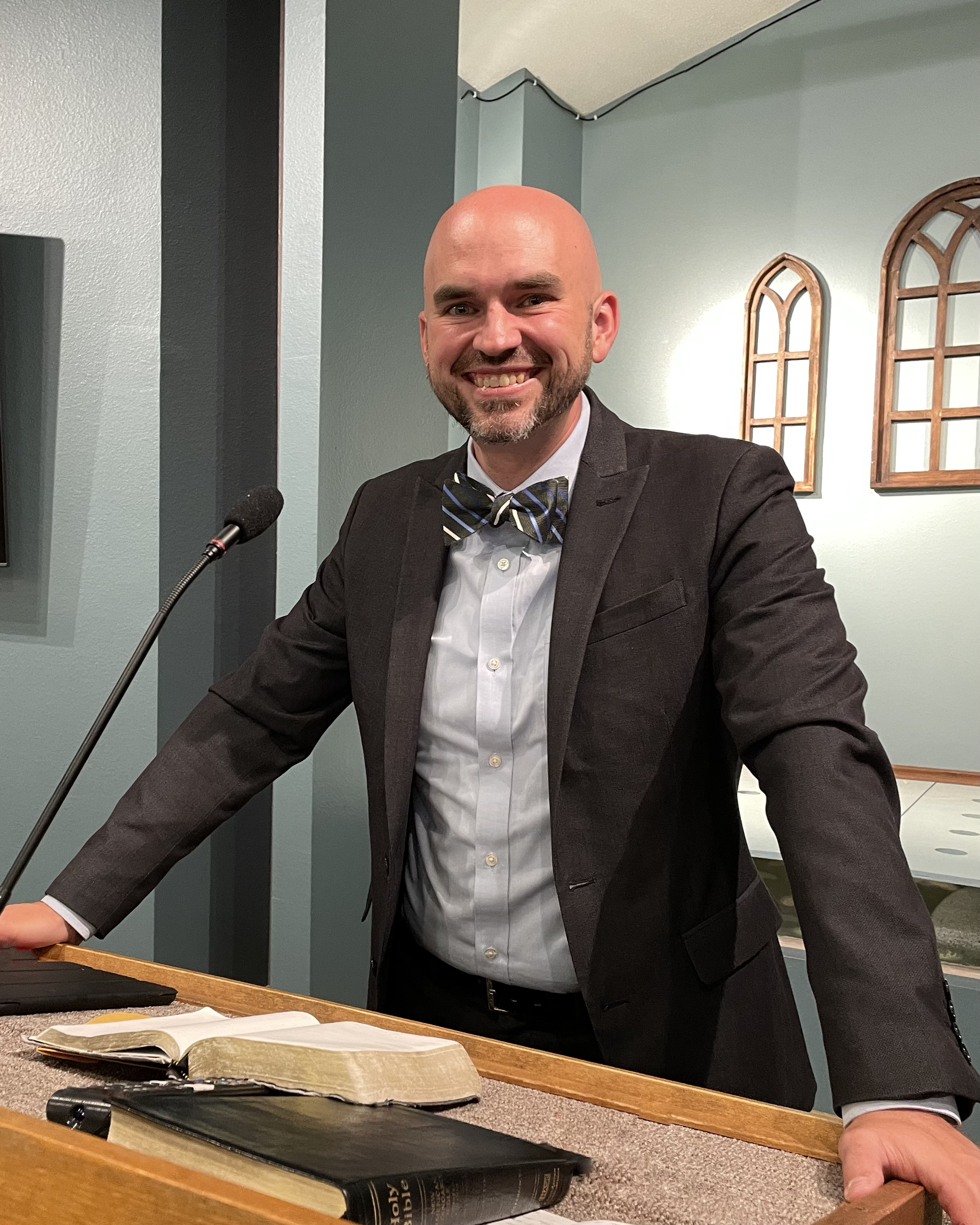Peruse Bible teachings and church happenings
Stand In the Gap | One Voice To Teach Masculinity
Wednesday, February 28, 2024
There’s some serious confusion around manhood in our culture. If you turn to any number of different outlets, you’ll receive any number of conflicting views about how to become a man, what’s wrong with men, and what makes a good man. So how can we know which one is right? How can we know what masculinity is really supposed to be like?
The key is to block out all the noise and listen only to one voice. A voice that will tell us the truth. The voice of God.
The word of God has many glimpses of the same things we see wrong with men in the modern world. In the Bible, we see weakness in places where men should have been strong. We see oppression and abuse where men should have been kind and accommodating. We see men who oppress women and children, who are unfaithful to their wives and families, whose foolishness ruins the lives of others around them, and whose godless arrogance destroys them.
And yet… There are examples of godly masculinity that repeatedly shine as bright lights out of that darkness. There are men who embody gentleness, wisdom, strength, meekness, care, and righteousness… all at the same time. Are they perfect? No. All of them, except for One, fail in some way. And yet they showed us how to strive for the ideal.
This coming Sunday’s sermon will be for men. We’ll talk about the way that godly men should be characterized by humility. We’ll talk about how humility drives both tenderness and toughness, how it helps us know when to speak and when to keep quiet, how it helps us to step up for those who need us, and how it manifests in our habits of self-control and self-discipline.
God told Ezekiel that he was seeking “for a man to stand in the gap” (Ez. 22:30) to do the right thing before God and others. We want to be the godly men who can do that when God calls upon us. So this Sunday’s lesson will give us a little bit of guidance toward doing that better than we ever have before.
- Dan Lankford, minister
Awed by Jesus
Sunday, February 25, 2024In this past week’s daily Bible reading schedule, we read through Luke chapter 8 and its collection of powerful moments from the life of Jesus. The chapter tells us about Jesus as a powerful teacher (vv. 1-18), a powerful unifier (vv. 19-21), a powerful God (vv. 22-39), and a powerful healer (vv. 40-56). Individually, each event is the kind of thing that we come to expect from the Lord when we’ve been around religious settings and the Bible for awhile. But when viewed all together, they show us just how truly great he is, and they remind us to occasionally stop and be wowed by Jesus.
It’s easy to get a little desensitized to how fearful and awe-inspiring the presence of Jesus could be at times. The occasions of his kindness and compassion are sometimes difficult to align with the occasions of his great miracles and hard sayings. We readily hear the sweetness in his voice as he tells the adulteress woman, “Daughter, your faith has healed you. Go in peace” (Lk. 8:48), but we sometimes forget that it’s the same voice who simply rebuked an intense storm and caused it to retreat from him (Lk. 8:24). Neither his softness nor his firmness nor his fearsomeness is everything that we need to know about him. We must understand and appreciate the whole picture of Jesus.
And so, let’s allow our hearts the requisite amount of breathing room to be properly awed by Jesus sometimes. Let’s be awed at his power as a teacher, as a unifier, as a healer, and as God. Let’s appreciate the fact that people who knew him well still feared him, even as they loved him. And let’s appreciate the fact that even in all of his greatness, splendor, and power; he loves us and calls us to himself.
- Dan Lankford, minister
Faith-Building Fridays | Purposeful Design & Our Life Purpose
Friday, February 23, 2024
The work of Christian apologetics largely comes down to arguments for and against certain things. But the necessity of those arguments stems from our responsibility to love and serve the one true God. Creation-versus-evolution is more than an argument to be won; it’s ultimately a discussion of whether we must obey God or not. This is especially true of the teleological argument: it’s not just about finding the fingerprints of God in his created universe. It’s a demonstration that the universe is not just a meaningless churning of matter and energy; it’s the design of a Creator. And that Creator creates with purpose. And that means that he has created us with a purpose.
God’s seven-day work of creation reaches its climax in the creation of mankind. The account of man’s creation says these familiar words: “Be fruitful and multiply and fill the earth and subdue it, and have dominion over the fish of the sea and over the birds of the heavens and over every living thing that moves on the earth.” (Gn. 1:28) There is a broad and deep purpose in those commands; a purpose that God gave to no other creature. Man is unlike all of God’s other creatures. There is a kind of nobility—what Francis Schaeffer called “mannishness”—that is unique to us. Man has a telos—a purpose, a responsibility to labor in God’s world to bring it into full alignment that glorifies Him.
No other earthly creature has such a grand purpose. No other creatures fills a role so important. No other creature has received the favor of God in such a special way. And no other creature has such responsibility put upon them.
This is where the implications of apologetics come into full view. If our arguments for God’s presence are true, then we must ask, “What does believing in God mean that I’m supposed to do?” The answer is that we are supposed to fulfill the purpose for which he made us. We are supposed to live in faithful service to him.
The universe is declaring that you were made on purpose, with a purpose. Go live that today, for the glory of God.
- Dan Lankford, minister
Entertained And Misaligned
Wednesday, February 21, 2024What do you most like to watch, listen to, or read? Does it fit with your being a sincere Christian?
Christians need to be intentional with the entertainment choices that we make. Streaming shows, books, movies, and social media videos that promote ungodly attitudes and sinful behaviors aren’t the kind of things that ought to characterize our habits. The things that we fill our minds and hearts with—the stories and thoughts to which we ascent—have a profound impact on us. Likable characters warm us up to their way of life, which is really problematic when that way of life is ungodly.
So let’s ask ourselves: Are we choosing to be entertained by senseless or careless violence? Is the loss of human life downplayed in our favorite stories, as though it were unimportant? Are we being led to laugh off certain sins? Is foul, sinful, cursing language used as though it were harmless? Are the things that we find entertaining attempting to make it unclear whether someone doing evil is a good guy or a bad guy, eroding our discernment about what’s right and wrong? Is sexuality portrayed in unholy ways that go beyond the proper love of husband and wife? Are things which God has declared sinful being portrayed as happy, freeing, pleasant, and good?
I recently heard a preacher note that when we allow ourselves to be entertained by something, we’re aligning our hearts with that thing, if only a little bit. There’s a small amount of conforming with its ideals that happens. And thinking about the danger of that reminded me of these words from Proverbs: “My son, if sinners entice you... my son, do not walk in the way with them; hold back your foot from their paths…” (Prv. 1:10-16) It’s a good reminder not to align ourselves with the world and their ways. Like the Spirit said through Paul, “Do not be conformed to this world, but be transformed by the renewal of your mind, that by testing you may discern what is the will of God, what is good and acceptable and perfect.” (Rm. 12:1)
The reality of living in a fallen world means that we won’t be able to put a full stop to the immorality that we see and hear about. The day-to-day world is full of it, and it finds its way into our lives in so many ways. But there’s a big difference between seeing immorality and seeking it. There’s a big difference between hearing of sins committed and honoring them as entertaining. There’s a big difference between knowing that sin is sinful and wondering if it’s sensible. The problem is not only what we see; it’s what we choose. Let’s make sure that we’re honestly trying to glorify God in everything that we do.
- Dan Lankford, minister
Active, Living Faith
Sunday, February 18, 2024“Show me your faith without your works and I will show you my faith by my works.” (Js. 2:18)
What are some things that you do that are specifically motivated by your belief that Jesus is the crucified and risen Son of God?
- Does that affect how much you give to those who are in need?
- Does it cause you to go visit fellow Christians who are sick or lonely?
- Does it make you hold your tongue from gossip, slander, or lashing out in anger?
- Does it motivate you to love your spouse exclusively and permanently?
- Does it drive you to dress in a modest, God-glorifying way?
- Does it make you responsible with your money: avoiding debt, giving to others, and choosing not to be greedy?
- Does it drive you to pray about life rather than complain about it?
- Does it keep you calm when anxiety would threaten to rule your thoughts and feelings?
- Does it help you see each person’s value with no partiality?
- Does it cause you to speak about Christ—to tell others what you believe and that they should believe in him too?
James said that if we have faith but that faith doesn’t act, then it’s useless. So let’s have authentic faith, brothers and sisters. Let’s be defined by what we believe and what we do in service to God. Let’s be sure that we are doing the good works God made us for, because that’s how we’ll know that our faith is the real thing.
“For as the body apart from the spirit is dead, so also faith apart from works is dead.” (Js. 2:26)
- Dan Lankford, minister
Faith-Building Fridays | Three Demos of Purpose
Friday, February 16, 2024
Last week, we discussed the teleological argument: that a universe which appears to be purposefully designed must surely have a designer. Here are some examples which we believe prove that point.
First: Earth’s placement in this solar system. As many scientists have noted, this is the only planet in the solar system which is suited for carbon-based life forms. Its perfect distance from the sun means we stay warm without baking to death. Its size allows gravity to hold us to the surface without crushing us. Its atmospheric gases are perfectly balanced for countless types of creatures to breathe them. Our single moon has the perfect ratio of mass, distance, and movement to keep the world’s tides moving (which keeps the oceans clean) without destroying life on land. These evident designs point to a Designer.
Second: The nature of many biological systems. Michael Behe coined the term “irreducible complexity” to describe biological systems where the removal of one part would disable the entire system. The principle shows a key problem of Evolutionary Theory, which believes that complex systems come into being one element at a time. But even in single-cell organisms, some things are so complex that they *must* have been designed as a complete system. These evident designs point to a Designer.
Third: The DNA code—a language, written in chains of nucleotides, which is so intricate that were its like discovered in any other setting, we would have no doubt that it had been created purposefully by an intelligent being. This “Signature in the Cell,” as Stephen Meyer calls it, shows another compelling example of purpose in the universe. It is yet another evident design that points to a Designer.
Ultimately, God’s purpose in creation is to glorify himself and share his immense love. He does things on purpose. So, whether we look to the planets and the stars, the cycles of waters and winds, the systems in cells, or our own existence (cf. Gen. 1:26-27), we will continue to see teleology. Reality has his fingerprints on it in so many ways that someone once said, “What can be known about God is plain to them, because God has shown it to them.”
- Dan Lankford
What We Give and What We Get
Wednesday, February 14, 2024Happy Valentine’s Day! Regardless of all the ways that the holiday gets downplayed or dismissed by so many, it’s a time that can remind every Christ-follower who is either dating, engaged, or married to think about how we behave toward our significant other or spouse. For Christians, that question is more specifically, “Am I being the person that God wants me to be toward the person that I love?”
- Are we kind? Or do we respond with carelessness and harshness?
- Do we give them the best of ourselves? Or do we leave them with the halfhearted leftovers of our energy and thoughtfulness?
- Do we encourage them to become the best version of themselves? Or do we fear that their accomplishments will drive a wedge between us?
- Are we sons and daughters of encouragement, breathing life and peace into their hearts? Or are we continually critical of their behavior, their words, their looks, or their efforts?
- Do we give gifts and speak admiring words as expressions of love? Or do we just forget and neglect to communicate love?
- Are we there to help with chores and other meaningful work in their lives? Or do we just ride on parallel life tracks that don’t intersect?
- Do we believe the best about them? Or do we think that they want to cause us some kind of harm?
The longer I ponder Paul’s words in Ephesians 5, the more their depth amazes me. He said, “as the church submits to Christ, so also wives should submit in everything to their husbands. Husbands, love your wives, as Christ loved the church… “Therefore a man shall leave his father and mother and hold fast to his wife, and the two shall become one flesh.” …let each one of you love his wife as himself, and let the wife see that she respects her husband.” (excerpts from Eph. 5:22-33) Any relationship that is truly loving involves two people who are each humble enough to make it about the other person. Selfishness and pride are relationship killers. The more focus we give to our own needs and what we will get from a relationship, the less gratifying we will find it. It’s only when we learn to truly give that we begin to find the true joy that God intends to give us.
So my encouragement is this: just take stock of what you’ve contributed and what you’ve been given. Thank God for the gifts, and commit to humbly serving; never for our own good, but always for others’ good and for God’s glory.
- Dan Lankford, minister
Just Preach Jesus
Sunday, February 11, 2024Once, a young preacher was told that he shouldn’t preach the truth straight and strong. No one wanted him to tell them what was right and what was wrong. So he asked an old time preacher what to do. The old preacher responded: “Just preach Jesus, born and crucified and risen from the dead. Preach that he paid for sin with the precious blood he shed. Preach that he is Lord and Savior, King of Kings, Son of God, and Son of Man. Just preach Jesus, son, until Jesus comes again.”
I can’t attest to the literal reality of that conversation; I just heard it in the lyrics of a Southern Gospel song. But I do love the sentiment and the spiritual truth that it encapsulates.
A complete understanding of The Gospel necessarily includes many things: teaching on morality, truth about creation and the sciences and the humanities, training in wisdom, and plenty more. But at its core, The Gospel is always simple: It’s the good news of Jesus Christ. And while it takes a whole Bible to make a whole Christian, God’s kingdom is built on one thing: Jesus, the Christ.
Paul wrote this to the Corinthians about a year after he’d taught them to follow Christ: “Now I would remind you, brothers, of the gospel I preached to you, which you received, in which you stand, and by which you are being saved… that Christ died for our sins in accordance with the Scriptures, that he was buried, that he was raised on the third day in accordance with the Scriptures, and that he appeared…” (1 Cor. 15:1-5)
So, when you think about the elements of Christianity, remember that it’s all anchored in who Jesus is. We are the church of Jesus Christ. He’s our all in all. Just preach Jesus. It’s all about Jesus.
- Dan Lankford, minister
Faith-Building Fridays | Designed With A Purpose
Friday, February 09, 2024
The truth that God created the universe is of utmost importance to the faith. And it’s no wonder that it continues to be so hotly debated. The logic follows perfectly easily: If God is not the creator, then the world is not his and neither are we, which releases us from responsibility of knowing him. Conversely, if God is the creator, then world is his and so are we, which means we’re accountable for serving him. And so this one fact is of truly great importance. Is God the source of existence, life, and human purpose; or is he not?
We are writing these articles because we believe that he is the creator. One of the reasons for this is the apparent design in the world—the fact that everything from the vastness of space to the precise perfection of the subatomic world bears the marks of purpose, design, and seamless fit. There is function and beauty in this reality that cannot have come to be by the atrophy that characterizes natural processes.
This is the principle of teleology. It’s the principle that says, “If a thing appears to have been designed with a purpose, then there must have been a mind behind that purpose.” This principle stands in direct opposition to naturalistic philosophy, which believes that all reality can and should be explained by unintelligent happenstance in the natural processes.
Evidence of a telos is abundant in the natural world. It is wonderfully ironic that many efforts to discredit divine creation lead us again and again to clearer evidence for its truth.
It’s no wonder that Paul said there are truths about God that can be known by observation of the natural world (Rm. 1:19-21). It’s no wonder that Job was left speechless as God enumerated the unknowable but clearly intentional workings of the natural world (Jb. 38-39). It’s no wonder that Jeremiah felt right in comparing God’s unwavering love to the predictable orderliness of the sun and the moon and the ocean’s rolling waves (Jr. 31:35-36). All of these, and many more besides, show that the function and beauty of reality are the work of an intelligent mind. Do they teach us his will for our lives? No. But they do stand as testaments to his existence and creative work.
- Dan Lankford
Faith-Building Fridays | A Cause for the Uncaused?
Friday, February 02, 2024
Every effect has a cause. That’s just common sense, isn’t it? We intuitively understand that whenever something happens (e.g. an apple falls from a tree), the event was caused by some force that acted upon it (e.g. the apple falls due to gravity). Every effect has a cause. In scientific circles, this is known as the Law of Causality.
Those who believe in God lean heavily on the Law of Causality. Just like apples don’t fall from trees without a cause, neither do universes explode into existence without a cause. So, we argue, the Law of Causality points to God. In response, some nonbelievers have raised an interesting objection,
“If God created all of these things, then who or what created God?”
It’s an intriguing question to be sure, but it has a simple answer – nothing created God. He is eternal, uncreated, and uncaused. Perhaps that answer seems like a cop-out to you, but I’d urge you to recognize that it makes a lot of sense. You see, while the Law of Causality holds true in the natural world, philosophers and thinkers have pointed out for millennia that in a world of cause and effect something or someone must be the first cause. There must be some force whose existence isn’t dependent on some other cause. Think about it this way…

Logic demands that there must have been an eternal, uncreated, uncaused first cause that set our world in motion. Christians call Him, “God.” God is not just another domino. He is the force that was ABLE to create this world without NEEDING to be created Himself. And that’s exactly how the Bible presents Him, “He is the Alpha and the Omega… who is and who was and who is to come” (Revelation 1:8).
- Jonathan Banning


